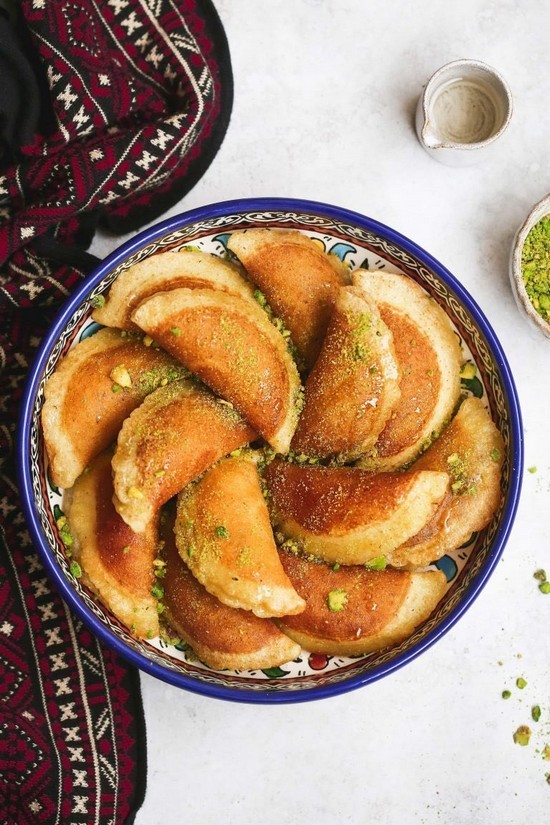Mohammad Ahmed Mattour has been running Halawiyat Al-Bustan, one of the most
famous pastry shops in Ramallah, in Palestine, since he took it over from
his father in 1994. Giant platters of desserts, from baklava and knafeh to
basbousa and kullaj, line the windows and shelves year-round. But come Ramadan,
the balance of business shifts, and qatayef, stuffed semolina pancakes, take
center stage.
اضافة اعلان
“We sell about 200 a day,” said Mattour, 43. “Not
pieces. Kilos.” Throughout the month, especially near the hour of iftar — the
breaking of the daily fast — the line outside the shop spills into the street,
with at least 30 people waiting at any given moment.

Mattour’s shop is not alone: The scene is the same
at other pastry shops across Ramallah and cities throughout the Arab world.
Today, there are two common varieties of these pancakes, which are cooked only
on one side. One is stuffed with either cheese or walnuts, folded into a
half-moon, then fried or baked and soaked in syrup. The other, smaller in size,
is stuffed with cream and only half sealed.
It’s then drizzled with a thick sugar syrup and
eaten fresh. People usually purchase the pancakes to take home and stuff, but
it’s also possible to buy them stuffed and ready to fry or bake, or even
stuffed, fried, soaked in syrup and ready to eat.
What really sets qatayef apart from other desserts
is the fact that they are a treat usually reserved for Ramadan, which begins
later this week. They are a sign that the holy month has arrived.
“They just taste different in Ramadan,” said Eman
Al-Ahmed, a fashion designer who lives in Jordan. Al-Ahmed, 47, makes her
qatayef at home and explained that she could prepare them throughout the year,
given how easy they are to make. But like most in the Arab word, she and her
family eat qatayef only during Ramadan, and they do so every single night of
the month.
Perhaps it’s the nostalgia and the generations-long tradition, ... but qatayef are this ritual that brings everyone in the community together.
“Perhaps it’s the nostalgia and the generations-long
tradition,” Al-Ahmed said. “But qatayef are this ritual that brings everyone in
the community together.”
Qatayef likely date back to the Middle Ages.
Although they are intimately connected with the Muslim fasting practice in
Ramadan, they transcend religion. As the treats show up in shops, everyone eats
them.
Jenny Haddad Mosher, 47, a Palestinian Christian
whose family does not observe Ramadan, said that during her childhood in
Kuwait, where she was born, everyone felt the shift in the air during the month
of Ramadan. But it was the qatayef her father brought home regularly that she
remembers most.
“We would go nuts when Baba walked in the door
carrying that package,” she said. “It came on a big paperboard tray, wrapped in
paper and tied with string, all the qatayef laid out beautifully around the
qatr container.” (Qatr is the sugar syrup that is used to sweeten the stuffed
pancakes, either by soaking them in it or drizzling it on top.)
The tradition is just as strong for Arabs in the US.
Rawan Shatara, 34, a pastry chef in Grand Rapids, Michigan, who immigrated from
Jordan as a toddler, used to make the two-hour drive to Dearborn with her
parents several times during Ramadan to buy qatayef. “It’s such an ingrained
part of the month,” she said.
Now, she makes qatayef herself, but she still likes
to make the trip to Dearborn, where, she said, “you really feel the atmosphere
of Ramadan, just like being back home.”

At Mattour’s pastry shop in Ramallah, sales usually
fluctuate throughout the month, spiking during the first and last days of
Ramadan. This year, he has had to raise prices on qatayef, as inflation has
affected pantry staples after Russia’s invasion of Ukraine.
“Maybe people will cut back on quantities, maybe they will
buy 1 kilogram instead of 1.5 kilograms, or maybe they will buy it less often
and not every night,” he said, adding that there’s “no way, absolutely no way,
Ramadan can pass by without people eating qatayef.”
Read more Good Food
Jordan News







